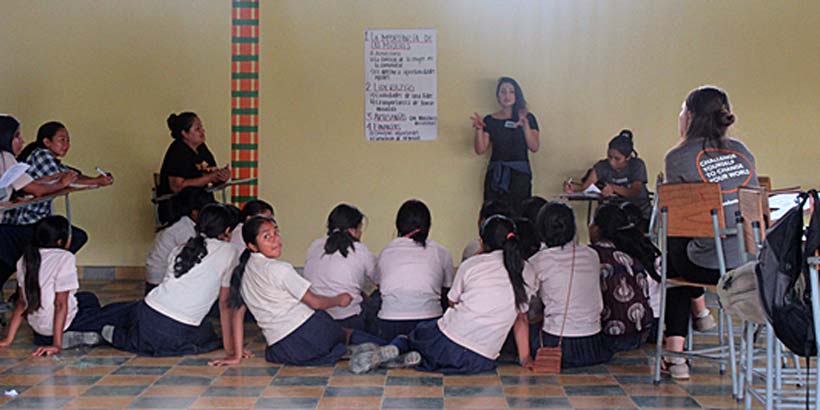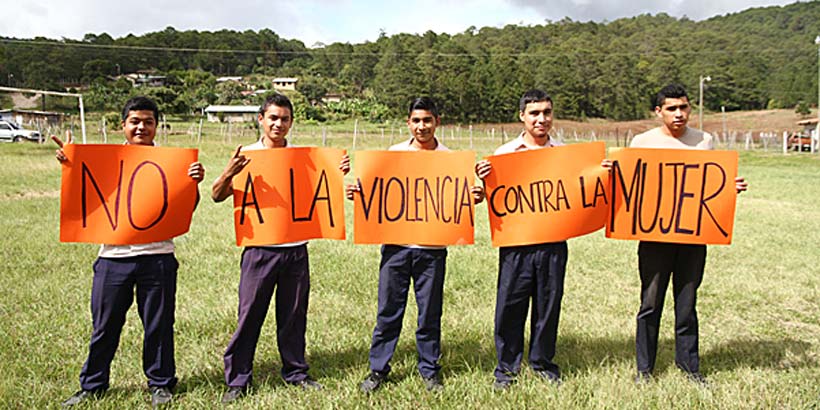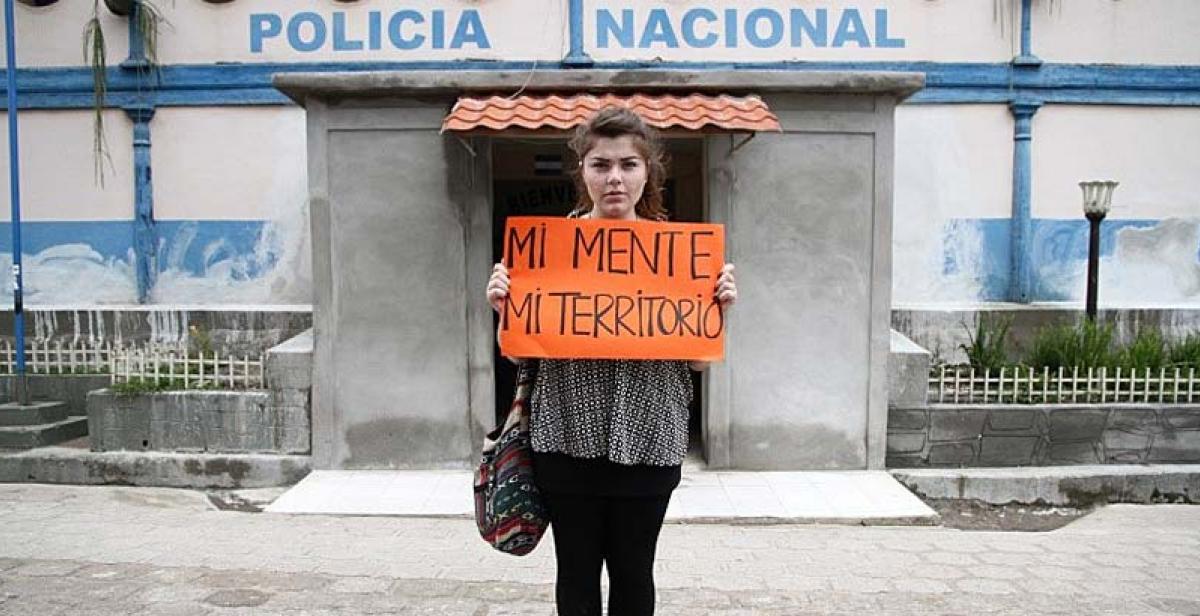For International Volunteer Day, on 5 December, our ICS volunteers in Honduras wrote a series of blogs reflecting on their experience and the importance of volunteering.
Upon applying for the ICS programme, I must admit I was doubtful I would succeed in my application. It probably shouldn’t have surprised me as much as it did; I have strong Spanish language skills and as a result I have been a helpful addition to the rest of my team. I was incredibly excited upon hearing about the work of my partner organisation Libre Expresión - they provide a platform for marginalised female populations to develop skills in order to encourage financial initiative. However, it’s difficult for international volunteers to arrive in a developing country without having idealistic expectations; I must confess I definitely did! I’ve found that the best thing for volunteers is to have no expectations, because nothing goes to plan. Although at first I found this absolutely terrifying, I’d say I now find it oddly comforting. Things seem to fall into place a lot easier and it’s all a lot less stressful if you just let it be.
While on the four-hour drive from Tegucigalpa to La Esperanza, despite the breathtakingly beautiful landscapes and scenery, it was hard not to notice the incredible levels of poverty. Houses completely isolated from communities, tiny mud shacks with tin roofs and incredibly young unaccompanied children walking alone in the middle of nowhere. The devastating effects of climate change were also clear to see - field upon field full of crops destroyed as a result of blistering heat, exasperated by the very little amount of rainfall. But at the other end of the spectrum, there is the other extreme where the rain falls so heavily that muddy landslides cause houses to slide down the mountains.
From speaking to various people in the community and national volunteers, I was informed that the province of Intibucá has one of the highest rates of alcoholism. Unfortunately, it’s hard to miss, every day that I have spent living in La Esperanza I have witnessed at least two seemingly homeless men passed out in the street. Flat out, unconscious in the middle of the road. I found this horrifying; I haven’t been in a situation before where this was so normal, where people are so desensitized to it that they simply step over these men, without checking on their wellbeing.
After studying a BSc Psychology with Criminal Behaviour at university, I have an invested interest in mental wellbeing and addiction. From the research I have done I have found that rates of addiction and suicide amongst indigenous populations are among the highest in the world. I had what I thought was a good understanding of this, but when I arrived I realised I had no clue. I have now been fully confronted with the realities of the lives that these indigenous populations live in. It’s incredibly difficult; low levels of literacy, low levels of employment, limited access to healthcare, poor sanitation, high levels of teenage pregnancy, and shocking levels of domestic violence. Machismo is unfortunately rife in rural Honduras, and coupled with the high rates of alcoholism this culminates in fatal cases of domestic violence. Since 2009 the rate of femicide has risen 160%, making Honduras the most dangerous country in the world to be a woman. From conversations with the female community, a very common tactic used by males to manipulate girls into sexual relations is the infamous ´prueba de amor´ or ‘proof of love’.
We have carried out numerous workshops in different topic areas to a group of indigenous women as well as to the students of the school we are working at (CETIIN). These sessions have covered a range of themes, such as violence against women and psychosocially influenced sex education - a topic specifically requested by the young girls of the CETIIN to cover. It has come to our attention, during the course of the project, that adolescents here in La Esperanza are already receiving the biological aspect of sex education in their school curriculum. However, they seem to be in need of learning about the emotional implications and consequences of engaging in intimate relationships.
The startling rates of teenage pregnancy and young women in their early 20s who already have several children, some by various fathers, perhaps shows that young girls specifically are in need of further empowerment and self-esteem workshops in order to reinforce the fact that love doesn’t have to manifest in physical intimacy. From the research and interactions I have had with local girls in the community, I have seen that young people here are in need of relationship advice more than anything.
The women and young girls we have worked with during our time in Intibucá have demonstrated misguided beliefs and opinions on what their roles in intimate relationships should be. The moment this really hit me was while delivering our sex education workshops - which, it must be mentioned, we have managed to deliver to eight different classes of boys and girls across La Esperanza, totalling over 250 students. We held an interactive true or false activity, where the students were asked whether they thought that ‘having intercourse with your partner was proof of love’. Surprisingly the groups of girls seemed very unsure and more than half of them believed it to be true. Interestingly, the same workshops and questions when delivered to their male counterparts showed unanimously that they did not believe that intercourse was proof of love. This further reinforced to me the necessity for further work to be carried out in the subject area to empower women to encourage change.

We have encountered a strong sense of hopelessness among the population, many feel powerless and unable to see things changing, so it has proved difficult to motivate people to want to help. There is also a strong sense of mistrust towards NGOs and similar organisations, due to the perceived high levels of corruption that the country has fallen victim to. There are still strong tensions in regards to politics and it’s a subject that we were told upon arrival to avoid. Unfortunately, this isn’t a problem unique to Honduras or Central America; this is a phenomenon that occurs in developing countries across the world. The answer isn’t to stop supporting these countries but rather to invest money in volunteers reducing the likelihood of corruption and which in turn will increase communities trust in NGOs. The answer isn’t money, but people powered development.
On 25 November - the International Day for the Elimination of Violence Against Women, it was decided among volunteers that we would create a video campaign to increase awareness of the violence that women are subject to around the world. The campaign was designed in a way that would get people talking about violence and encouraging people to speak out, instead of suffering alone. Our campaign video, which featured people of all ages, genders and nationality holding orange placards saying ‘my mind/body, my territory’ or ‘your mind/body, your territory’, proved a success and exceeded 1000+ views in under 24 hours. But the most impactful aspect of the making of this video has definitely been the open discussions we had on the street struck up with people from the local community, who are grateful and supportive of change.

Furthermore, on the ICS programme UK volunteers have been paired with national volunteers, young people who have an interest in the development of their country. After the time I have spent working and living in Honduras, I now firmly believe in this method of international development. The key to this is to motivate young people to be more involved in the change and development of their own countries. People must want to help other people for the simple reason that they want to help, not for any other reason, such as financial or selfish rewards. It is this that will foster good citizenship and this is how young people can help transform the world.
Written by ICS volunteer Sasha Jamalaldini



